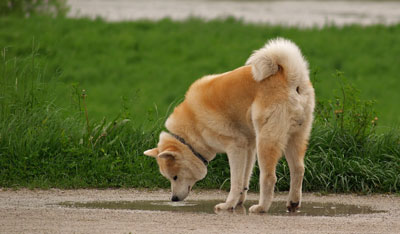Resources
Medical Articles
Browse our article library on pet care and medical information to answer many of your pet health questions.
Medical Articles
Antifreeze Poisoning
Antifreeze and windshield washer fluids contain a product called ethylene glycol. Ethylene glycol is sweet and has a taste that is attractive to both dogs and cats. Just a small amount of antifreeze consumed by a pet can cause irreversible kidney damage, leading to coma and death.
Animals are often poisoned by licking up spills in the garage, on the driveway, or on the street. Pets living in urban or suburban areas seem to be more exposed to this poison.

Ingestion of ethylene glycol causes central nervous system depression. Animals appear to be disoriented and in a stupor. Eventually a pet becomes comatose and unresponsive. Death results from kidney failure.
If you suspect that your pet consumed even the smallest amount of antifreeze, don't wait for symptoms to appear. This is an emergency and you should rush your pet to a veterinary hospital. If it is not possible to obtain immediate veterinary care, induce vomiting and administer activated charcoal. This will reduce the amount of toxin that your pet's body absorbs.
A non-toxic antifreeze is now available for use in car radiators. The next time you have your car radiator flushed, ask the mechanic to replace the old antifreeze with new non-toxic type.
[ Search Articles ] [ Article Index ] [ Previous Page ]


 10 Walsh Lane
10 Walsh Lane


